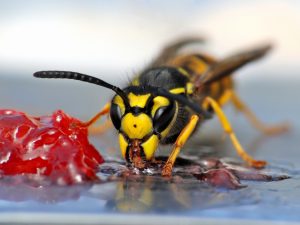
Summer is here — and so are wasps, hornets, bees and other stinging insects. If you have an allergy, you want to take steps to stay safe. Here are some tips for helping to prevent stings, and what to do in an emergency.
At the Park
- Wear shoes to avoid stepping on stinging insects. If you see them in the grass, move to another area.
- Avoid eating outside when wasps, bees or hornets are present. They are attracted to most food, but especially sweet food and drinks.
- If you are drinking, use a cup instead of a bottle or can. Stinging insects can crawl under the mouth of a bottle or inside a can where you can’t see them.
- Garbage cans are a food source for them. Be careful when throwing out garbage at the park.
- Avoid wearing perfume or using scented products, as this can attract them.
- If you are being pursued by a stinging insect, walk quickly in a straight line to get away. Do not weave around or move your arms, which can be perceived as aggression. Do not attempt to kill it, as others may swarm in response.
At Home
- Keep screens in good repair. Check door and window frames for holes where they can enter your home.
- If you have wasp, hornet or bees’ nests on your property, have them professionally removed.
- Keep garbage in a secured bin, far from places where you sit or play.
- Remember that some stinging insects nest on the ground. Holes such as drain pipes, animal burrows or diggings by a dog are all potential nests.
- If you have fruit trees, pick the fruit before it gets over-ripe or drops to the ground.
In an Emergency
If you have a stinging-insect allergy, always carry your epinephrine auto-injector. Medical identification jewelry (such as a MedicAlert® bracelet) is highly recommended. Let your friends, family and coworkers know about your allergy as well.
If you are stung, don’t wait. Use your EpiPen, then call 911. Studies have shown that the longer a person waits before receiving epinephrine, the greater the risk of severe consequences, including death. Remember, epinephrine is the first line of treatment for anaphylaxis. Benadryl does not reverse anaphylaxis.
A Note about Immunotherapy
For some people, insect sting allergy can be cured with immunotherapy. This is an allergy desensitizing process where an allergist gradually administers stronger and stronger doses of insect venom over a period of time. If you are interested in immunotherapy, speak to your allergist.
Learn more about wasp and other stinging insect allergy on our website.
Tags: bees, hornets, stinging insects, wasps